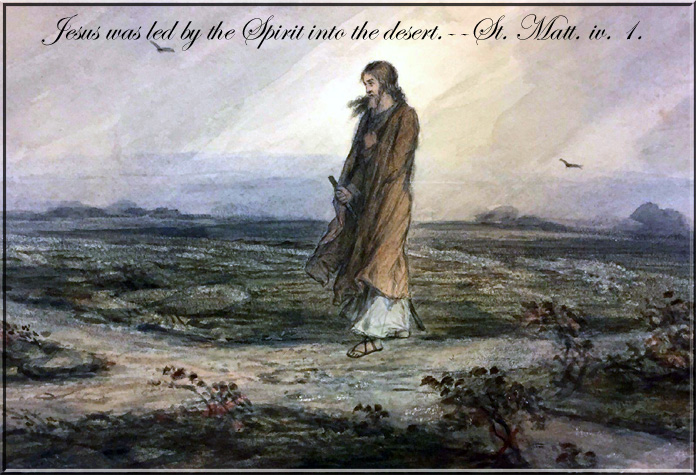
|
HOW TO FAST IN THE HEART by the Priests of the Congregation of St. Paul, 1893
The Spirit of God, which inspired every word He uttered and guided every act He performed, led our Divine Lord and Saviour, Jesus Christ, to enter upon His forty days' fast in the desert. And the spirit of Catholic faith and devotion, which is also the Spirit of God, directs us to imitate, as far as we may, the action and the example of our Lord and Master during the Holy Season now before us. The imitation of Christ is the one essential aim of Christian life, and if we seek not to follow in the path He trod, our Christianity is a delusion and a lie.
Today in particular, we are called upon to give proof of the faith that is in us by a closer correspondence to the life of self-denial and mortification the Divine Redeemer led, and unless we give heed to this call our claim to be His disciples were but a mockery indeed. We must take up the cross; and Holy Church now determines for us what its weight shall be. Fasting and abstinence, prayer and penance, are commanded, and we are bound to obey. And if we have the spirit of Catholic faith, our obedience shall be cheerfully given. Do we not owe a debt of love to the Son of God, who sacrificed Himself for us? And how can we repay it unless we make sacrifices for His sake? The spirit, then, with which we should enter upon our Lenten duties, is that of generous self-sacrifice for the love of God, not a craven spirit of fear at the thought of bodily discomfort and mortification. The most austere life is sweet and easy when inspired by the love of God, and the most difficult acts of self-denial are cheerfully performed when prompted by the desire to imitate the sufferings of Christ. The saints kept ceaseless fast and vigil, and were happy withal. The martyrs, in the midst of their terrible torments, enjoyed a peace that surpasseth all understanding, and if generous Christian motives actuate us, our fasts and our abstinences, while they chasten the body, shall soothe the soul, for as love casteth out fear, peace banishes the thought of pain. Do we not, moreover, owe a debt of penance for our sins? and how shall we redeem it, save by suffering? It were difficult to explain the exact relation between sin and suffering, but certain it is the relation exists between them. The reason of mankind has always recognized this relation, and the Cross of Jesus Christ is an eternal demonstration of it. It is a fact of every-day observation that the grossest natures are purified and elevated by suffering. The relations between the soul and body in this life are so intimate that whatever chastens the one serves to purify the other. And, as the body is the instrument of the passions of the soul, so the body is justly the instrument of the soul's penance and purification. All that is elevated in human life, and all that is spiritual in human nature, comes from the victory over the lower passions of man; and all that is Christ-like in the Christian soul comes from the crucifixion of flesh and blood. Hence, it is only by acts of self-denial that we can purify the grossness of our nature, and it is only by works of penance that we can expiate our sins. Sensuality is the unclean spirit that can only be cast out by fasting and prayer. Purification and expiation cannot be purchased at any less cost than this. But there is another aspect of this subject which we must lay to heart. Lent is a time for interior repentance even more than external works of penance. "Rend your hearts and not your garments," is the motto that is set before us in all our penitential exercises. External practices count for little without the renewal of the soul. What merit can a man have for his fasts or his abstinences when his heart is a hot-bed of sin, and he crucifies Christ by his corrupt deeds while he pretends to imitate Him by keeping the Lent? Sin must be repented of and abandoned, there must be sorrow of the soul, otherwise the mortification of the body will not profit us much. Do not, therefore, deceive yourselves! Let no man imagine for a moment that he can get any real good out of the Lenten season as long as he remains the willing slave of sin. It were little short of sacrilege for the wretched drunkard, the wanton blasphemer, the unjust hypocrite, the foul votary of lust, to pretend to live in the spirit of the Lenten time, if they do not at once call a halt and curb their base passions. Let every Christian-soul recognize the solemn duty of the hour. This season of Lent demands some sacrifice from all. Something special must now be done for Christ's sake. If you cannot fast, give alms, hear Mass every morning, visit the church every evening, give up drink and other unnecessary indulgences of the appetite. The Cross has to be taken up in some shape or other if we mean to follow Christ. The heights of Calvary are before us, and to reach heaven climb them we must. Without a part in their gloom there can be no share in their glory. http://catholicharboroffaithandmorals.com/ |